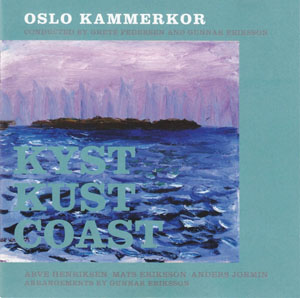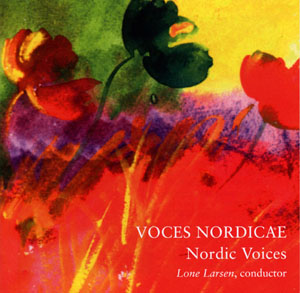 The Olso Kammerkor, based in the Uranienborg Church in Oslo, is an internationally known chorus with an extraordinarily wide repertoire, ranging from Gregorian chant to jazz and folk music. The group has been most widely recognized for its translations of folk music into a choral setting. Grete Pedersen, who founded the chorus in 1984, is joined as conductor on Kyst, Kust, Coast by Gunnar Eriksson, who made the arrangements used in this recording. The chorus is ably supported by trumpeter Arve Henriksen, guitarist Mats Eriksson, and bassist Anders Jormin.
The Olso Kammerkor, based in the Uranienborg Church in Oslo, is an internationally known chorus with an extraordinarily wide repertoire, ranging from Gregorian chant to jazz and folk music. The group has been most widely recognized for its translations of folk music into a choral setting. Grete Pedersen, who founded the chorus in 1984, is joined as conductor on Kyst, Kust, Coast by Gunnar Eriksson, who made the arrangements used in this recording. The chorus is ably supported by trumpeter Arve Henriksen, guitarist Mats Eriksson, and bassist Anders Jormin.
Most of the songs on this disc affirm what I had known about Scandinavian choral singing in general: the emphasis is on close harmonies and a blended sound, supported by a very smooth delivery. The chorus does, however, take liberties. The “Ballad om briggen ‘Blue Bird” av Hull” (“Ballad of the Brig ‘Blue Bird’ of Hull,” by Swedish balladeer Evert Taube) begins with an instrumental introduction that is almost eerie before returning to the kind of sound one expects. “Svarteborg,” a traditional song in both Sweden and Norway, again starts off with a haunting introduction by guitar and trumpet before slowly progressing into a “story” of Ola Dilt, given a blues treatment, while the various elements of the chorus pursue different melodic lines. It is a delightful surprise, offering some real vocal pyrotechnics, with moments of what the notes call a “peasant’s rap song,” Norwegian style: soloists Toril Aae (soprano), Frode Fjortoft (tenor), Havard Gravdal (tenor), and Astri Skarpengland (alto) give us a “rap round” that segues into a lovely choral melody that softens but loses none of the liveliness before the blues guitar appears again. It is an extended treatment, at nearly 13 minutes, running through several moods.
“Sommernatt ved fjorden” (“Summer Night by the Fjord”) is a more expected song, noteworthy for the clear soprano of soloist Bente Helen Asebo. It is followed by “Vi skal ikkje sova bort sumarnatta” (“We Shall Not Sleep”), a beautiful melody given a spare, haunting treatment in which the chorus and trumpet blend together, with the trumpet taking on the feel of a flute in passages. “Danse, ikke grate na” (“Dance, Don’t Cry Now”), is actually a contemporary song by composer Lillebjorn Nilsen, though its feeling and lyrics are strongly evocative of folk music: “This earth shall give you food, this river shall give you water, this girl shall bear your child, this earth shall be your grave – slowly tread the dance. Dance, don’t cry now.” Somehow, that strikes me as very Nordic. The disc ends with “En hattespellman,” another work by Evert Taubman, a melancholy but very beautiful ballad with a distinct Left Bank bistro feeling to it.
Oslo Kammerkor offers a fairly traditional selection with some nice variations, and manages to capture in many of their offerings a quality that I’ve always thought of as particularly Nordic: there is a kind of darkness to many of these songs, a recognition of life’s sometime harshness, but resignation becomes acceptance and mingles with a strong feeling of joy.
 Voces Nordicae is a chorus formed in 1999 by conductor Lone Larsen, a Dane who did her studies in choral conducting at the Royal College of Music in Stockholm. The group focuses on Nordic music of the twentieth century, with a strong interest in folk and African American music as well. Nordic Voices offers a broad range of works not only from Scandinavia, but acknowledging the choral music of other nations as well.
Voces Nordicae is a chorus formed in 1999 by conductor Lone Larsen, a Dane who did her studies in choral conducting at the Royal College of Music in Stockholm. The group focuses on Nordic music of the twentieth century, with a strong interest in folk and African American music as well. Nordic Voices offers a broad range of works not only from Scandinavia, but acknowledging the choral music of other nations as well.
The opening track, “Fjaugen,” with music by Jan Ekedahl, is from a folk music play on the legendary master smith Volund, taken from the Icelandic Eddas. The sound, admirably produced by Bjorn Paulsson (flute), Per Henrik Andersson (recorder) and Micke Nilsson (percussion), has a distinctly Irish feel to it (and I do wonder often lately about the artistic cross fertilization between Ireland and Scandinavia in the days of the Vikings — founders of Dublin). “Min Ynglinsdal” (“My Favorite Valley”) is a haunting a cappella piece by Danish composer Jorgen Jersild, with a strongly traditional feel, although it is definitely a work of the twentieth century. The following work, “Sagastipean,” by Basque composer Javier Busto, with lyrics by Basque poet Inazio Mujika, offers some spellbinding moments in which the chorus forgets about a smooth, blended Nordic sound and delivers some awesome, almost raw segments before falling back into a serenely melodic passage possessed of an amazing clarity.
Three motets from Vagn Holmboe’s Liber Cantorum make a striking middle section to the collection, a mix of reverence, intensity, and ethereality that is mesmerizing. Lars Jansson’s “To the Mothers in Brazil/Salve Regina” is again a thoroughly contemporary offering with lyrics from a thirteenth-century hymn, and shows both Jansson’s and the chorus’ ease with varying traditions – the music has a definite lilt, almost a samba rhythm that somehow is perfectly in keeping with the prayer to Mary of the text. Estonian composer Urmas Sisask’s “Bendictio“, with its three lines of text, gives the chorus an opportunity for a brilliant display over seven minutes in length. The disc finishes with four songs from Shakespeare by Jaakko Mantyjarvi of Finland. Texts from Twelfth Night (“Come Away, Death”), A Midsummer Night’s Dream (the “Lullaby”), MacBeth (“Double, Double Toil and Trouble”) and The Tempest (“Full Fathom Five”) sound very traditional but offer some glimmering surprises: the composer uses the devices of contemporary music sparingly, but to great effect. “Full Fathom Five,” Ariel’s song from The Tempest is particularly choice, at once melancholy and a little bit threatening. (I have often thought that Ariel is not really all that nice anyway.)
The chorus displays a gratifying command of its material, ably supported by the instrumentalists, and the choice of selections — according to the notes, favorites from their repertoire — offers some fascinating glimpses into the work of composers who may not be all that familiar outside of Scandinavia.
Together, these two discs offer a good glimpse of the range of choral music in the Nordic countries, from traditional folk songs to thoroughly contemporary choral works. I found them particularly hard to review, simply because I was too absorbed in listening to write anything down.
(Footprint Records, 2004)
(Footprint Records, 2003)
